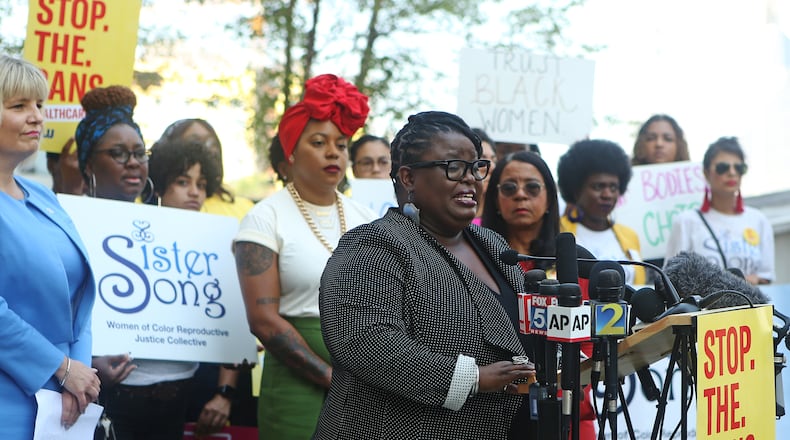A federal judge said it could be a few weeks before he rules on a case challenging Georgia’s anti-abortion law, saying he wanted to wait until the U.S. Supreme Court decides another abortion case.
Gov. Brian Kemp last year signed one of the nation's strictest abortion laws, outlawing the procedure in most cases once a doctor can detect fetal cardiac activity. District Judge Steve C. Jones in October temporarily blocked the law from going into effect while the case plays out in court. It was set to take effect the first day of this year.
The U.S. Supreme Court in May heard arguments in a Louisiana case to determine whether the state can require abortion providers to have admitting privileges at nearby hospitals. Four years ago, the court found a nearly identical Texas law unconstitutional, but the makeup of the court has shifted with the addition of two justices appointed by President Donald Trump.
Jones said a ruling from the U.S. Supreme Court could change previous legal standards. The U.S. Supreme Court will issue rulings on cases it heard earlier this year through June 30 but could put the abortion case off until later.
“I think it would be not wise for me to issue a ruling,” Jones said. “I think that case would have some bearing on my decision.”
If previous standards change, attorneys may need to file additional documents to support their arguments, Jones said.
The American Civil Liberties Union of Georgia wants Jones to make the injunction he placed on Georgia's law permanent. The group, on behalf of several abortion rights advocates and providers, sued the state, saying the law violates a woman's constitutional right to abortion as established by the U.S. Supreme Court ruling in Roe v. Wade.
Attorneys for the state say the case should be dismissed and the law should be allowed to go into effect. Any ruling in the case would almost certainly be appealed.
Elizabeth Watson, an attorney for the ACLU, said the new law was essentially a ban on abortions and that the U.S. Supreme Court has ruled repeatedly that states cannot limit access to the procedure before a fetus is viable — usually 24 weeks.
Jones also considered various so-called "personhood" provisions in the legislation, which extend legal rights to fertilized eggs.
The ACLU argued that the “personhood” components of the law were vague and made it difficult for its clients — abortion providers — to know when they are in violation.
Watson said allowing the provisions to become law would have a chilling effect on medical providers.
“To restrict that care from imposing a vague law, where providers don’t know how to treat their patients, the implications here are vast and the harm is severe,” Watson said. “And that is why Georgians would benefit from an injunction here.”
The “personhood” language in the law would allow parents, once a fetal heartbeat is detected, to claim an embryo on their taxes as a dependent, and the embryo would be counted toward the state’s population. Under the law, a court could also order a father to pay child support after a heartbeat is detected.
Attorneys for the state argue that the new law, which was introduced as House Bill 481, does not violate a woman's constitutional right because she can still get an abortion before cardiac activity is detected. If it goes into effect, it would outlaw abortions as early as six weeks into a pregnancy, before many women know they are pregnant.
Jones wrote in the October ruling that he agreed the language was too vague.
Jeffrey Harris, an attorney representing the state, said there was no legal guidance on considering “heartbeat” laws.
“We think that the Supreme Court has never looked at a case just like this one and there are very legitimate state interests here,” Harris said. “The line of a heartbeat (as viability) is based on very good bioethics.”
About the Author
Keep Reading
The Latest
Featured



